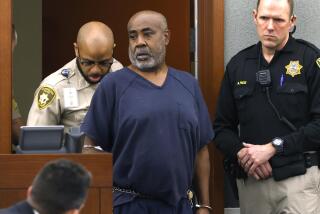Manson family killer Bruce Davis gets parole grant, but may not walk
- Share via
Gov. Jerry Brown has 150 days to decide whether Manson family member Bruce Davis -- convicted for his role in the murder of two men in 1969 -- should go free after he was issued a grant of parole.
Davis was convicted in 1972 for his role in the murders of ranch hand Donald “Shorty” Shea, who also worked as a Hollywood stuntman, and aspiring musician Gary Hinman.
Brown blocked his release last year, concluding that Davis, who was 26 at the time of the killings, still posed a threat to society.
In 2010, then-Gov. Arnold Schwarzenegger also blocked a similar grant for release, saying Davis “would pose an unreasonable risk of danger to society.”
PHOTOS: The Manson family murders
Details of Shea’s killing have remained murky, muddled more by Davis’ recent account that the ranch hand was taken to a different location and killed -- and not the night that prosecutors claimed, but the following morning.
Another Manson family member, Steve “Clem” Grogan, allegedly cut off Shea’s head. Grogan, the only Manson family member convicted of murder to be set free, won parole in 1985 by leading law enforcement to Shea’s body. California corrections officials said he has since had no criminal offenses in this state.
Hinman was held captive for days, tortured and then killed in July 1969 as part of an extortion plot at the outset of the infamous Manson family murder spree.
Shea’s 1969 fatal stabbing and beheading reportedly took place because Manson believed he was a police informant.
Davis, like Grogan, was not implicated in the 1969 murders of actress Sharon Tate and four others in a Benedict Canyon home, nor in the Leno and Rosemary LaBianca killings.
Review panelists cited Davis’ “positive adjustment, record of no recent disciplinary problems, and for successfully completing academic and vocational education and self-help programs” in recommending his release.
In blocking Davis’ release from prison last year, Brown wrote that the convicted killer had not done enough to explain his role in the murders and why he no longer posed a threat.
“Until Davis can acknowledge and explain why he actively championed the Family’s interests, and shed more light on the nature of his involvement, I am not prepared to release him,” Brown wrote.
More to Read
Sign up for Essential California
The most important California stories and recommendations in your inbox every morning.
You may occasionally receive promotional content from the Los Angeles Times.










